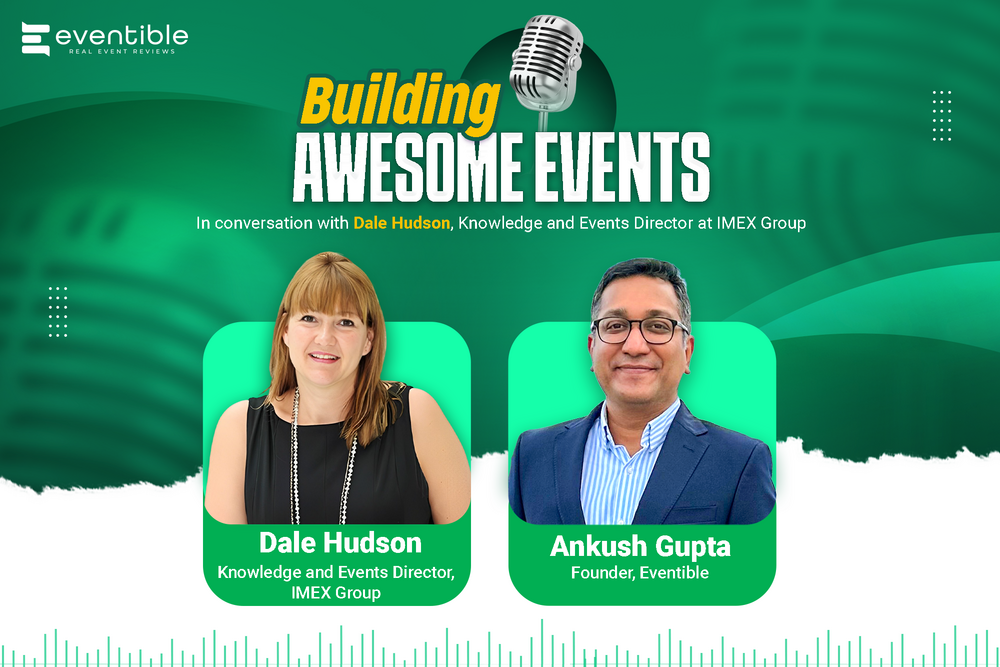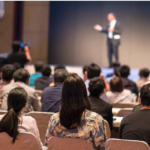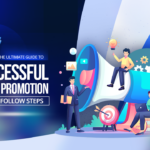Ankush Gupta (00:34): Hi, everyone, I’m Ankush, founder at Eventible.com, and you are listening to Building Awesome Events. Our guest today is a very, very seasoned event professional. Please welcome Dale Hudson, Knowledge and Events Director at the IMEX Group. Hi Dale, thanks so much for joining our show today.
Dale Hudson (00:50): Hi, Ankush. It’s lovely to be with you today.
Ankush Gupta (00:53): Lovely to have you Dale. Shall we start at the beginning, Dale, for some background for our listeners? I saw, and this blew me away. You’ve been in events for the better part of 25 years now. Is this something that you’ve always wanted to do?
Dale Hudson (01:07): Well, funny enough, no. I, at the very beginning of my career, I was actually thinking of going into geography. I love geography, and you know, I loved all things around geography and sustainability. So, I was going to focus on sustainability. But I landed up working for another company, an event company, where I got the opportunity to actually work a little bit on the environmental side of things. It got my interest even more peaked, and I thought actually there’s a very big area within environmental issues within events. Of course, in those days, nobody was even thinking about it. But I thought, well, what the heck? I’ll go to university, I’ll do a management degree, and I’ll focus on environmental studies within the management degree, which I did.
And I was lucky enough in those days as well to have the contact of Ray Bloom, who’s the chairman at IMEX, and he allowed me to do some research on event providers around the environmental issues within the industry. And that’s why I carried on. Ray Bloom was quite instrumental in my joining the events industry. I would say, he’s an incredible man, and he’s built up two very big International exhibitions. So yes, I would say that he was instrumental in encouraging me to join the industry.
Ankush Gupta (02:34): Right. Wonderful. And, of course, you’ve been 22 years with IMEX, which is just stupendous. Was this a conscious decision, as you’re pointing out now? Or is this something that happened just organically?
Dale Hudson (02:46): No, I would say, at this point, it was a conscious decision. I had been in the events industry, gone to university to come out, and then did a few roles within education around Marcos marketing and events within Education Sphere. And when Ray said, he was setting up IMEX again, he said, would I like to come back? And I said, yes, I would very much like to come back. At that point, it wasn’t a specific role. It was launching the organization. It was launching a new show. And so I had a lot of freedom, I would say, to explore a little bit within that space. And that’s what has kept me motivated, and I’ve absolutely loved my time, working on all various projects and visions. We called it New Vision to start with. And it’s just been an exciting role to have within IMEX because of that freedom, I would say, and the ability to be more creative in designing around the event.
Ankush Gupta (03:44): What’s been the most satisfying program you’ve had a chance to contribute a lead at IMEX?
Dale Hudson (03:49): There’s actually a few of them, Ankush. I obviously love the Future Leaders Forum, which is looking at young professionals coming into the industry. That’s one I’ve been doing since, the very beginning of IMEX. Then, I’ve been able to work on the Women’s Leadership on sustainability, implementing sustainability within the organization and CSR projects.
And also just being able to actually work specifically around designing, so working to design these experiences for people so that they’re very much people orientated. We have, ‘She means Business’, which is a women’s forum, which I absolutely have loved doing. And then there’s also the ‘Voice For All”, which is a new program that I’ve just set up within IMEX, which is looking very much at inclusivity at events and within organizations.
So, I would definitely say there’s been a lot of programs I’ve loved. I also love the general education. I’ve started the Wellbeing Program, which has also taken off and has now been taken up into our industry specifically. A lot of people are now doing well-being initiatives at their events.
Ankush Gupta (05:00): That sounds great. The question that pops into our mind, Dale, is that you would’ve started designing all of these events as in-person experiences, and then what happened in the pandemic years, I mean, were you then suddenly had to pivot to more of a virtual show?
Dale Hudson (05:20): We did, yes. So we did two really large ones. IMEX is very much a live show, though. It’s very much an in-person event. So, the virtual for us was very important. We kept our community, we kept engagement through virtual, but it was never going to be our long-term business proposition. It was always going to be something where we kept everybody together and connected, and we offered some great education as well over that period. But I think, as everyone knows, yeah.
Ankush Gupta (05:50): Did you learn something specifically through the virtual experience? Perhaps it was easier to acquire more participants around the world. Is that something that you would consider incorporating in future events, or was it like a happy return back to the in-person format?
Dale Hudson (06:10): I think we can safely say it was a happy return to life because it is very much a networking connection business event. That’s what IMEX is. You never say never, you know. I think that we have explored a little bit with the hybrid side of things and that’s been great. But I think that the majority of people want to come to an event like IMEX.
I would love to see a little bit of like high-quality education being put out from the show. I think that there’s no, that can only help people who can’t make it. There’s lots of reasons why people can’t make it to a live show. So I’d love to be able to still be able to do that, just to allow those people who can’t be there one or two years or whatever to still feel engaged and feel that they’re not getting too much FOMO from not being at the live event. Yeah.
Ankush Gupta (07:00): Absolutely. Dale, would it be right to say that the Future Leaders Forum has been at the center of IMEX’s educational outreach? Shall we talk a little about this and why you feel it’s so important to share this knowledge with final-year students thinking about joining the meetings industry?
Dale Hudson (07:16): Oh, now you’re talking to my heart, Ankush. I love this. I love the Future Leaders Forum. We’ve actually reached over about 10,000 students within our industry all studying at, different times of the year. We started this program in 2004, so it’s been going a long while. So, a lot of these students are now connected and working together, and there is definitely a community around the future leaders.
It’s hugely important for our industry within events because you need people who are motivated, who have studied, and who want to come into the industry because they actually feel that they know what they’re coming into. And I think the Future Leaders Forum gives them that. We do a lot of networking for the students. We do an education program. There’s the ability for them to meet, senior professionals within the industry. So it does give them a very nice idea about what they’re coming into. Whereas I think pure University is very important. I really, really highly recommend studying within the industry before you come into it. But it doesn’t give them that hands-on knowledge. It doesn’t give them that feel of what an event is really about.
Ankush Gupta (08:32): Right. And is there any chance of them scoring internships? Is that built into this event? Do you help them find internships with other event organizers?
Dale Hudson (08:44): Yeah, we don’t help them find them. But we provide the platform for them to find them. So, the Future Leaders Forum is actually a franchised forum. So, it takes place at other events around the world as well. All forums have to have some educational content. They have to have a networking opportunity. So that gives them the chance to actually, find internships and find jobs. Lots of them have found jobs when coming to these events. Yeah, it’s quite an important aspect. I think, within the events industry to really promote young leaders coming into our industry because they are the future of it, and we do need to care for them and look out for them.
Ankush Gupta (09:28): Absolutely. They learned if, experienced event professionals should like to volunteer their time for these initiatives. Is it possible to get in touch with you or someone else at IMEX?
Dale Hudson (09:41): Yes. I mean, we are always looking for good speakers to come and speak at IMEX. So there is a lady called Tahira Endean , who people can get in contact with, and she’s head of programming. She would be able to help with any inquiries as to speaking. We don’t generally have a lot of volunteers at IMEX. That’s not something that we’ve done typically in the past. But we do always have to try and encourage young people to be there and to come and listen to the education programs, and they can report back and things like that on the education, which we love them doing.
Ankush Gupta (10:16): Absolutely. So, that’s helpful to know, Dale. We are coming to the end of our short segment today, and I’ve been meaning to ask you this: What does social proof mean to you, Dale?
We live in a review-based economy today, and that we look at reviews before making a participation or purchase decision for almost everything we do buy. Do you think it’s important that folk look at event reviews before making a participation decision? Do you feel event organizers have been able to understand the value of social proof from what you’ve seen?
Dale Hudson (10:47): I think that there isn’t really a platform at the moment that I’m aware of any way that is something like TripAdvisor or that thing. But I know that a lot of events do work very much still on word of mouth, bringing in people from the organization once they’ve been to it, they bring more people in, and they recommend it to colleagues.
So, I think that the events industry is very much based on heavy marketing and recommendations. I think people don’t. We’ll generally not go back to an event that they haven’t enjoyed, and they won’t recommend it. So I think there is some value in that, and every event is only as good as the last event they held. I think that especially in, certain sectors people would love to be able to go into a sector area have a long list of events that are recommended, especially if they knew to that sector. And they’re looking for information and knowledge. I think, yes, it would be a very useful tool for people attending events.
Ankush Gupta (11:48): Absolutely. I wholeheartedly agree with what you just said. It makes so much sense. And Dale, thank you so much for taking the time out and speaking with us today. We wish you all the best with your future initiatives.
Dale Hudson (12:01): Thank you Ankush. And thank you for having me.





Comments are closed.